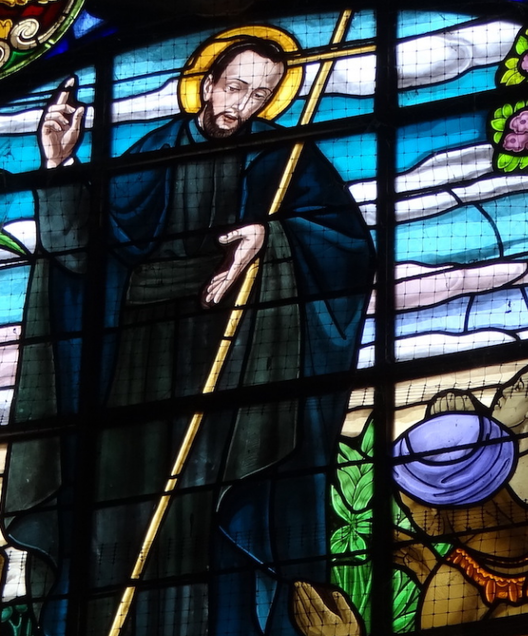Saint Peter Claver
 After
he had completed his studies, Claver entered the Society of Jesus in
Tarragona at the age of 20. When he had completed the novitiate, he
was sent to study philosophy at Palma, Mallorca. While there, he
came to know the porter of the college, St. Alphonsus Rodriguez, a
laybrother known for his holiness and gift of prophecy. Rodriguez
felt that he had been told by God that Claver was to spend his life
in service in the colonies of New Spain, and he frequently urged the
young student to accept that calling.
After
he had completed his studies, Claver entered the Society of Jesus in
Tarragona at the age of 20. When he had completed the novitiate, he
was sent to study philosophy at Palma, Mallorca. While there, he
came to know the porter of the college, St. Alphonsus Rodriguez, a
laybrother known for his holiness and gift of prophecy. Rodriguez
felt that he had been told by God that Claver was to spend his life
in service in the colonies of New Spain, and he frequently urged the
young student to accept that calling.
Cartagena was a slave-trading hub and 10,000 slaves poured into the port yearly, crossing the Atlantic from West Africa under conditions so foul that an estimated one-third died in transit. Although the slave trade was condemned by Pope Paul III and Urban VIII had issued a papal decree prohibiting slavery, (later called "supreme villainy" by Pope Pius IX), it was a lucrative business and continued to flourish.
Claver's predecessor in his eventual lifelong mission, Father Alonso de Sandoval, S.J., was his mentor and inspiration. Sandoval devoted himself to serving the slaves for 40 years before Claver arrived to continue his work. Whereas Sandoval had visited the slaves where they worked, Claver preferred to head for the wharf as soon as a slave ship entered the port. Boarding the ship, he entered the filthy and diseased holds to treat and minister to their badly treated, terrified human cargo, who had survived a voyage of several months under horrible conditions. It was difficult to move around on the ships, because the slave traffickers filled them to capacity. The slaves were often told they were being taken to a land where they would be eaten. Claver wore a cloak, which he would lend to anyone in need. A legend arose that whoever wore the cloak received lifetime health and was cured of all disease. After the slaves were herded from the ship and penned in nearby yards to be scrutinized by crowds of buyers, Claver joined them with medicine, food, bread, brandy, lemons and tobacco. With the help of interpreters and pictures which he carried with him, he gave basic instructions.
Claver saw the slaves as fellow Christians, encouraging others to do so as well. During the season when slavers were not accustomed to arrive, he traversed the country, visiting plantation after plantation, to give spiritual consolation to the slaves. During his 40 years of ministry it is estimated that he personally catechized and baptized 300,000 slaves. He would then follow up on them to ensure that as Christians they received their Christian and civil rights. His mission extended beyond caring for slaves, however. He preached in the city square, to sailors and traders and conducted country missions, returning every spring to visit those he had baptized, ensuring that they were treated humanely. During these missions, whenever possible he avoided the hospitality of planters and overseers; instead, he would lodge in the slave quarters.
Claver's work on behalf of
slaves did not prevent him from ministering to the souls of
well-to-do members of society, traders and visitors to Cartagena
(including Muslims and English Protestants) and condemned criminals,
many of whom he spiritually prepared for death; he was also a
frequent visitor at the city's hospitals. Through years of
unremitting toil and the force of his own unique personality, the
slaves' situation slowly improved. In time he became a moral force,
the Apostle of Cartagena.
Feast Day: September 9
Patron Saint2 of:
African Americans
African Missions
Colombia
Interracial Justice
Other Links about Peter Claver:
KofC
TFP.org
CatholicExchange
1. Wikipedia;
https://en.wikipedia.org/wiki/Peter_Claver; retrieved Sept. 9, 2020.
2. Franciscan Media;
https://www.franciscanmedia.org/saint-peter-claver/
Image source: St. Peter Claver Catholic Church St. Paul, MN.